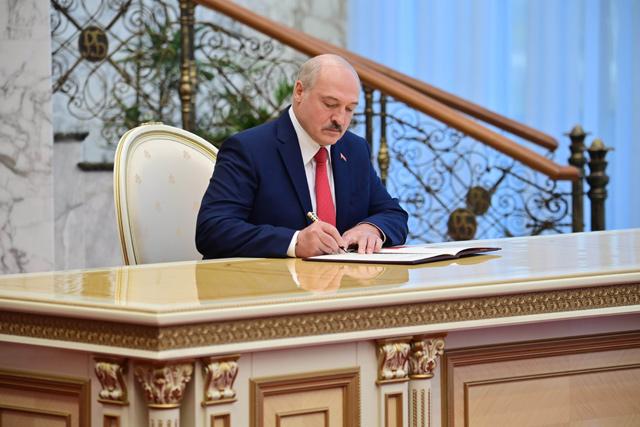- International News
- Thu-2020-09-24 | 10:21 pm

Lukashenko has faced massive demonstrations against his rule since claiming victory with more than 80 per cent in a presidential election on August 9, with tens of thousands marching at the latest protest in the capital Minsk on Sunday.
The date of his inauguration for a sixth term had not been announced, but on Wednesday morning, the Belta state news agency broke the news that "Alexander Lukashenko has taken office as President of Belarus".
Belta said the ceremony was taking place "in these minutes" in the Palace of Independence where the president has his offices and which has been a focus of demonstrations.
The announcement came after independent media reported that Lukashenko's motorcade had raced through the capital, prompting speculation that the inauguration was due to take place.
The ceremony was not shown live on state television.
"If the inauguration had been announced in advance, 200,000 demonstrators would have gathered outside his palace," said Ales Belyatsky, head of the Viasna rights group, which monitors political prisoners.
He predicted Lukashenko's assuming office while seen by many as an "illegitimate president" would trigger "even larger mass protests".
The furtive move prompted mockery from Lukashenko's political foes.
"Such a farce. Forged elections. Forged inauguration," tweeted Lithuanian Foreign Minister Linas Linkevicius.
"Where are the rejoicing citizens? Where is the diplomatic corps?" questioned opposition activist and former minister Pavel Latushko on social media, likening the ceremony to a gangster convention.
Rights lawyer Garri Pogonyailo said Lukashenko behaved like a "coward" and "like any dark deed, tried to do this in secret".
Despite its secretive nature, the ceremony featured the usual pomp and several hundred guests, according to the presidential website.
‘Devilish’ tactics
Belta published photographs of the 66-year-old leader, in power since 1994, swearing the oath of allegiance at a podium in a blue suit with his hand on a copy of the Constitution, watched by officials and state media journalists.
In his address, Lukashenko preened himself on overcoming the political crisis, saying he and his allies had "prevented a catastrophe”.
Belarus has faced an "unprecedented challenge” from "devilishly sophisticated” tactics directed from abroad, he said.
"But we were one of the very few, maybe even the only one, where the colour revolution didn’t work out,” he said.
He called this "the choice of the Belarusians who don’t want to lose their country”.
Riot police have harshly detained thousands of protesters who have reported torture and abuse in custody, prompting international condemnation and proposed EU sanctions.
In a bizarre episode, Lukashenko viewed one protest rally from his helicopter, describing the demonstrators as "rats”, and later disembarked in a bullet-proof vest carrying a Kalashnikov.
Never ‘abandon’ nation
The authorities have rolled out military vehicles including armed personnel carriers and used water cannon and tear gas during protests.
Lukashenko’s main opposition rival, Svetlana Tikhanovskaya, claimed she won the election but has taken shelter in EU member Lithuania, while the strongman has jailed or driven out other key opposition figures.
In his inaugural address, Lukashenko said: "I can’t, I don’t have the right to abandon Belarusians.”
He described the protests as "disorientation of society” and thanked state employees and law enforcement for showing "firmness”.
Following the inauguration, armed forces swore an oath of allegiance to the president, Belta reported.
Lukashenko has sought support from Russian President Vladimir Putin, who has promised him law enforcement backup if needed, as well as a $1.5 billion loan.
European Union foreign ministers on Monday failed to agree sanctions over the political crisis, despite a plea for support from Tikhanovskaya.













